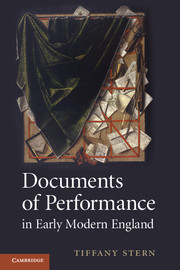Book contents
- Frontmatter
- Contents
- Acknowledgements
- Textual note
- Introduction: Playwrights as play-patchers
- 1 Plot-scenarios
- 2 Playbills and title-pages
- 3 ‘Arguments’ in playhouse and book
- 4 Prologues, epilogues, interim entertainments
- 5 Songs and masques
- 6 Scrolls
- 7 Backstage-plots
- 8 The approved ‘book’ and actors' parts
- Conclusion: Repatching the play
- Notes
- Bibliography
- Index
8 - The approved ‘book’ and actors' parts
Published online by Cambridge University Press: 18 December 2009
- Frontmatter
- Contents
- Acknowledgements
- Textual note
- Introduction: Playwrights as play-patchers
- 1 Plot-scenarios
- 2 Playbills and title-pages
- 3 ‘Arguments’ in playhouse and book
- 4 Prologues, epilogues, interim entertainments
- 5 Songs and masques
- 6 Scrolls
- 7 Backstage-plots
- 8 The approved ‘book’ and actors' parts
- Conclusion: Repatching the play
- Notes
- Bibliography
- Index
Summary
INTRODUCTION
This chapter will explore the relationship between surviving full plays and performed dialogue. Were actors' parts – the scripts actors received consisting of their speeches and cues – the descendant of the playhouse book, or could they be texts originating from an earlier source? And, irrespective of source, how perfectly were actors' parts extracted from the play by copyists, and with what accuracy were they then performed?
THE APPROVED BOOK AND PERFORMANCE
A habit of claiming absolute authority for the full text as overseen and corrected by successive Masters of the Revels, Edmund Tilney (1579–1610), Sir George Buc (1603–22), Sir John Astley (1622) and Sir Henry Herbert (1623–73), has led critics to ignore how often unapproved words and passages were heard on the stage. But, as Dutton showed in 1991, ‘the censorship of English Renaissance drama was neither as totalitarian nor draconian as it is often held to be’. Yes, the Master of the Revels did censor most (but not all) playtexts; yes, when actors were attacked for any reason they used the Master of the Revels' approval as stated at the end of a playbook as their defence – and always, obviously, claimed to have added nothing to the dramas they performed.
- Type
- Chapter
- Information
- Documents of Performance in Early Modern England , pp. 232 - 252Publisher: Cambridge University PressPrint publication year: 2009
- 1
- Cited by



